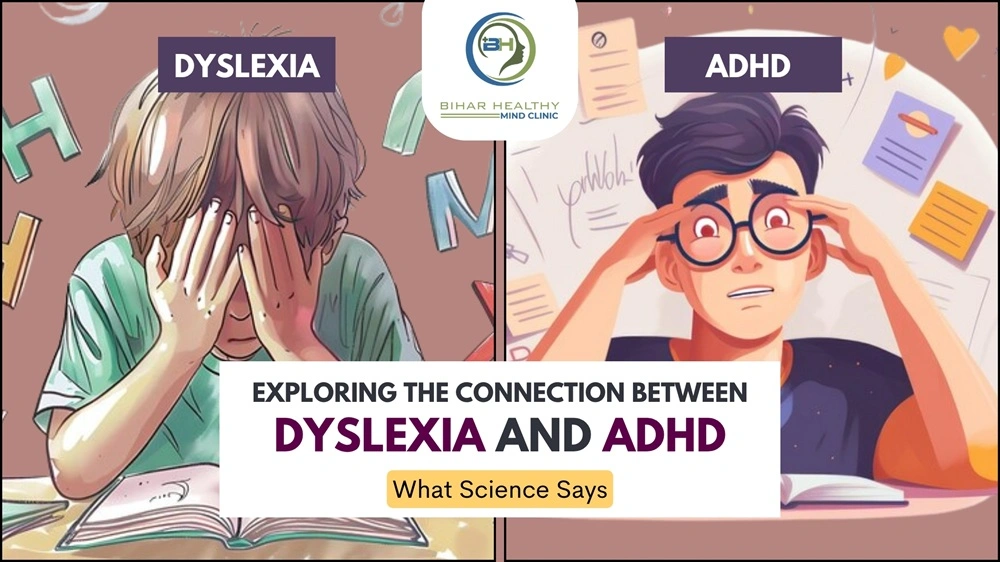
When parents or teachers observe a child struggling with reading, writing, or focusing in class, two conditions often come to mind, dyslexia and ADHD. Both are among the most common neurodevelopmental disorders diagnosed in children, and they often coexist. But are ADHD and dyslexia related, or are they entirely different challenges that simply occur together? Let’s explore this question in detail with professional insights from Patna Psychiatry, where Dr. Saurabh Kumar, MD (Psychiatry) widely regarded as the best psychiatrist in Patna, provides comprehensive evaluation and treatment for such complex conditions.
Understanding ADHD and Dyslexia: Two Different Challenges
Before understanding how ADHD and dyslexia intersect, it’s important to know what each condition means.
Attention Deficit Hyperactivity Disorder (ADHD) is a neurodevelopmental condition that affects attention span, impulse control, and activity levels. Children or adults with ADHD may find it difficult to stay organized, focus on tasks, or control impulsive behaviors. ADHD is often categorized into three types, inattentive, hyperactive-impulsive, and combined.
Dyslexia, on the other hand, is a specific learning disorder that primarily affects reading, spelling, and writing abilities. Individuals with dyslexia usually have difficulty decoding words, identifying letter-sound relationships, and comprehending written language. However, dyslexia does not indicate low intelligence, many people with dyslexia are highly creative and intelligent.
Although they are separate diagnoses, the overlap between dyslexia and ADHD is quite common and has become an area of major research interest in psychiatry and neuroscience.
Are Dyslexia and ADHD Related? The Science Behind the Overlap
Several studies suggest that ADHD and dyslexia share common neurological roots. Both conditions involve differences in how the brain processes information especially in areas related to language, attention, and working memory.
Research has shown that approximately 30%-40% of children with dyslexia also have ADHD, and vice versa. The connection may stem from shared dysfunction in brain regions like the prefrontal cortex and parietal lobes, which are responsible for attention, language processing, and executive functions.
In simpler terms, while dyslexia primarily affects how one processes written language, ADHD influences how one maintains focus and attention and when combined, they can amplify each other’s challenges. This means a child with both dyslexia and ADHD may struggle not just with reading, but also with sustaining attention long enough to improve reading skills.
Symptoms That Overlap Between Dyslexia and ADHD
-
Some of the overlapping symptoms between ADHD and dyslexia include:
- Difficulty focusing on reading or writing tasks
- Trouble following instructions or completing assignments
- Low academic confidence despite normal intelligence
- Poor memory retention and recall
Challenges with time management and organization
These overlapping signs can often lead to misdiagnosis or delayed diagnosis, especially if one condition masks the other. That’s why an expert evaluation by a psychiatrist or clinical psychologist is essential to distinguish between the two and design an effective treatment plan.
How ADHD Can Influence Reading and Learning
ADHD affects executive functioning, the brain’s ability to plan, organize, and stay attentive. This has a direct impact on how a person with ADHD dyslexia learns and processes information.
-
For example:
- A student with ADHD might skip words or lines while reading because of poor attention control.
- They might understand the content but struggle to finish reading due to restlessness.
- Their impulsivity can also interfere with focusing long enough to practice reading skills needed to overcome dyslexia.
Thus, while dyslexia primarily affects reading mechanics, ADHD adds another layer of difficulty by reducing focus and consistency.
Diagnosis: The Key to Understanding Both Conditions
At Patna Psychiatry, Dr. Saurabh Kumar emphasizes the importance of a comprehensive neuropsychological assessment for children showing signs of learning or attention difficulties.
-
The diagnosis of dyslexia and ADHD involves:
- Clinical interviews with parents and teachers
- Standardized psychological and educational tests
- Observation of reading, writing, and attention patterns
- Behavioral assessments
Accurate diagnosis is crucial because treating one condition while ignoring the other can result in limited improvement. For instance, focusing only on dyslexia therapy without managing ADHD may hinder learning progress.
Treatment Approaches for ADHD and Dyslexia
Both ADHD and dyslexia require tailored, multidisciplinary management involving therapy, medication (if required), and educational interventions.
For ADHD:
- Behavioral therapy to improve focus and discipline
- Medication (under psychiatric supervision) to enhance attention span
- Parent and teacher counseling for structured support
For Dyslexia:
- Specialized reading interventions (like phonics-based programs)
- Educational therapy for reading comprehension
- Use of assistive technology such as audiobooks and text-to-speech tools
When both conditions coexist, combining these approaches under expert supervision helps achieve the best outcomes. At Patna Psychiatry, Dr. Saurabh Kumar offers personalized plans that address both behavioral and cognitive challenges, ensuring long-term improvement.
Why Early Intervention Matters
The earlier ADHD and dyslexia are identified, the better the chances of academic and emotional success. Early intervention prevents self-esteem issues, academic failure, and emotional distress that often arise from years of struggle without proper support. Parents and teachers must be proactive in recognizing warning signs and seeking timely psychiatric evaluation.
Final Thoughts: Bridging Understanding and Support
While dyslexia and ADHD are distinct conditions, their coexistence is common and impactful. Understanding how they overlap helps families, teachers, and clinicians offer better support. With professional guidance from experts like Dr. Saurabh Kumar, the best psychiatrist in Patna, individuals with ADHD and dyslexia can learn to manage their challenges effectively and reach their full potential.
If you or your child show signs of learning or attention difficulties, don’t delay seeking help. Visit Patna Psychiatry for a thorough evaluation and compassionate, evidence-based care.
Visitors: 74





No comments yet.